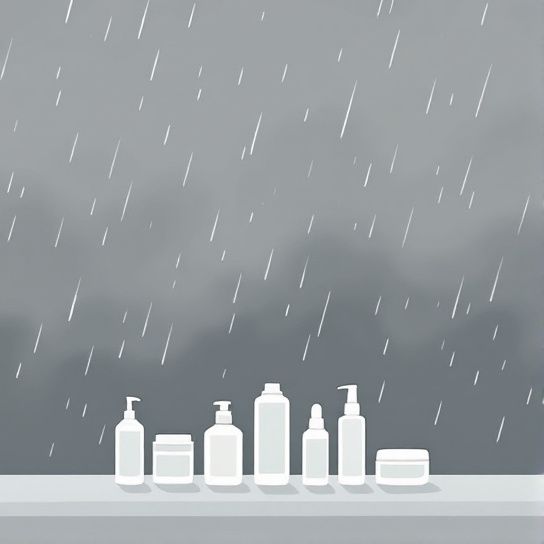Picture this: The sky darkens, wind howls, and sheets of rain come crashing down. It’s storm day, and while you might be cozy inside with a warm beverage, your skin is out there fighting its own battle. Yep, stormy weather can do a number on your skin—welcome to the world of “climate acne.” Ever heard of it? No? Well, let’s dive in. This is your all-in-one guide to keeping your skin calm, collected, and breakout-free when the weather’s anything but easy.
What is Climate Acne Anyway?
Yeah, let’s start with the basics: climate acne. The name kinda gives it away, right? It’s acne that’s influenced by (drum roll, please) the climate! When storms roll in, the atmosphere shifts like a moody teenager. Pressure changes, humidity spikes, and other environmental stresses—this storm cocktail sets the stage for your skin to break out. You might’ve never pinned acne on the weather before now, but surprise, your skin’s super tuned into what’s happening outside.
Why Storms Trigger Your Skin
Here’s the lowdown: stormy weather equals wild swings in temperature and air pressure. It messes with humidity levels, turns the air from crisp to swamp-level damp, and then there’s the wind. All this chaos spells trouble for your skin. Your sebum production—yep, that’s the oil—goes haywire, often leading to clogged pores. In essence, your skin’s protective barriers play catch-up, struggling to navigate the maze of environmental stressors.
But don’t worry; we’re all in this storm-together, and I’ve got just the actionable solutions for you. Promise.
How to Keep Your Skin Calm During a Storm
Step 1: Adjust Your Skincare Routine
Time to cut to the chase. A storm day is not your average sunny Tuesday! So, what’s the game plan? Change your skincare routine to better match the mood outside.

- Reduce Oil Production: Look for a gentle, pH-balanced cleanser. We’re talking mild for better oil control without dry-out city.
- Hydrating Toner: Right after cleansing. Get a toner that’s hydrating. Think witch hazel meets rose water.
- Non-comedogenic Moisturizer: Light but hydrating to fight off any damp windfeed trickery outside.
- Sunscreen: Yes, even with endless grey clouds. UV rays sneak through, and they’re not your skin’s friends.
Give it a whirl and check how your skin feels and reacts.
Step 2: Balance Those Serums and Masks
Serums and masks are like your skincare’s secret weapon—there when you need a little more bang for your buck, especially during storms.
- Serums: Try something that fights inflammation. Niacinamide fits like a glove – it’s a zen master for skin, calming irritation and redness.
- Masks: Use a clay mask to suck out impurities or a sheet mask if you need a hydration bomb. Your choice will depend on whether you’re more ‘dry & thirsty’ or ‘oily & clogged.’
Step 3: Mind the Humidity
Storms bring funky humidity levels, either drying your skin into a fritter or making it an unwanted oil slick. A nifty humidifier indoors can counteract the external pressure changes by keeping the humidity stable.
Step 4: Don’t Forget to Breathe—Literally
Anxiety and stress ice the storm-cake. They’re notorious for sparking flare-ups, including climate acne. People’s mood can be as gray as the skies. So, when your world feels stormy, take a break. Do deep breathing, meditation, or just a simple stretch session.
Storm-Day Protection Layer-by-Layer
Layering is your friend, just like with clothing. We’re talking about smart layering under harsh weather conditions to ensure your skin has that ‘extra coverage.’

- Layer 1 (Protection): Sunscreen or a protective base.
- Layer 2 (Reinforcement): Lightweight barrier creams to lock moisture.
- Layer 3 (Adaptation): If you brave the outdoors, a light facial mist spray traveling along is amazing. It’s like mini spa moments—that extra turbo refresh.
Circling Back: Nutritional Tips
Can’t overstate it, what you eat is crucial. During storm season, load up on antioxidants. Yep, more berries, greens, and omega-rich fish. Think of them as the cavalry in your skin’s storm defense.
- Antioxidant-rich foods: Spinach, blueberries, nuts.
- Hydration heroes: Cucumber, grapes, water-rich foods (plus plain ol’ water).
- Healthy fats: Avocado, walnuts—give them some space on your plate.
Your diet schools your skin on dealing with stress, both internal and external.
Pressure Changes Are Key
Ever noticed how your joints feel on a stormy day? That’s barometric pressure changes—adds a little crazy to your ache-factor list. But believe it or not, pressure shifts tap dance all over your skin’s resourcefulness too.
Tools for Pressure Balance
Battery might be running low, and unlike our sunscreen chat, you can’t apply a gadget for immunity boost. But don’t sweat it! Exercise is your stealthy soldier here.
- Simple highs: Walking—initially calms nerves then energy rise leads to endorphin party amidst the gloomy sky.
- Strength sessions: Couple of reps indoors. Try iterations of yoga or pilates adapted for snug spaces on stormy days.
Comparing Skincare Choices for Different Climatic Conditions

| **Climatic Condition** | **Skin Needs** | **Skincare Move** | **Action** |
|---|---|---|---|
| Hot and Dry | Hydration Boost | Creams, rather than gel or light lotions | Apply thicker creams |
| Hot and Humid | Mattifying and Anti-Acne | Gel moisturizers, mattifying powders | Treatment serums |
| Cold and Wet (Stormy) | Barrier Protection | Protective oils, creamy textures to lock moisture | Rich creams and oils |
| Cold and Dry | Intense Moisture | Barrier high face moisturizers | Apply humidifiers indoors |
A mundane list becomes your sortie planner, so adapt based on your day and geographic locale.
Common Mistakes in Storm-Day Skincare
Let’s spare you the rookie stumbles. Here’s the hit list of the don’ts:
- Skipping Sunscreen: We talked about UV rays smuggling through clouds. Please make sunscreen a must.
- Heavy Makeup: Our skin needs to breathe. Cut down on cake-layers during wild weather.
- Forgetful Sparing Practice: Love your travel skincare minis. Keep choices minimal when travelling out mid-storm.
Remember—it’s about responding cleverly to weather triggers, not combat in repeats.
The After-Zen: Recovery Post-Storm
Once the tempest calms, do your letting-go routine. Seriously. Offer your skin downtime, bask in a relaxed atmosphere where diffusion plates and tea hands crossing as default settings.
Rehash your AM and PM skincare then do a slow zoom-out to reintroduce change. Eval your skin’s comfort compass—spot that cycle? Relief tune-ups while reducing past friction points staves cascading bumps.
And there it is, your encamped retreat notes wrapped up, fused and downloaded. Next time storms overstate-their-welcome, align your internal green like it’s any old storm-cloud day. Your skin’s a nerd, it stays on course if you deep dive into these small climate stories!
Frequently Asked Questions
How does climate change affect acne?
Climate change, particularly warmer temperatures and increased UV radiation, can exacerbate acne. These conditions can stimulate the growth of *Cutibacterium acnes* (C. acnes), increase sebum levels, and cause pilosebaceous unit swelling, leading to acne flares[3][5].
What role does air pollution play in climate acne?
Air pollution is a significant environmental factor that can contribute to acne. Pollutants can alter the skin microbiome and increase oxidative stress, which can lead to inflammation and the development of acne lesions[1][3][5].
How does humidity impact acne in the context of climate change?
High humidity can increase pilosebaceous unit swelling and contribute to the clogging of pores, which can worsen acne. This, combined with warmer temperatures, creates an environment that fosters the growth of acne-causing bacteria[3][5].
What can be done to protect the skin from climate-related acne?
To protect the skin from climate-related acne, it is important to maintain a consistent skincare routine, use non-comedogenic products, apply sunscreen with SPF 30 or higher, and exfoliate gently to keep follicles clear. Additionally, staying hydrated and avoiding excessive sun exposure can help mitigate the effects of climate change on the skin[1][3].
References- Proactiv. (n.d.). How the environment & pollution affects your skin. Proactiv®.
- Dermatology Times. (n.d.). Acne Flares May be Worsened by Climate Change. Dermatology Times.
- PMC. (n.d.). A Review of Advancement on Influencing Factors of Acne. PMC.











